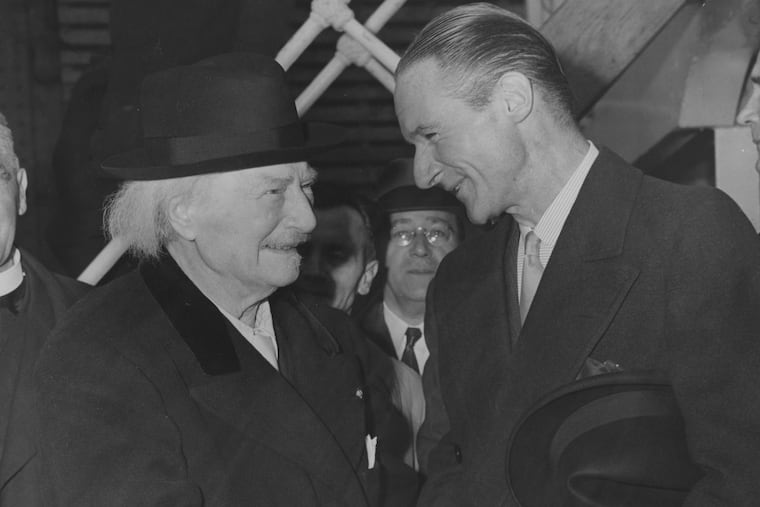Philly's Anthony Biddle, a life of diplomacy in turbulent times | Philly History
On Sept. 1, Biddle awoke in Warsaw to bomb sirens as Germany began its invasion of Poland.

This month marks 120 years since the birth of Anthony J. Drexel Biddle Jr., a distinguished Philadelphia native who became one of the most respected and accomplished diplomats in U.S. history.
Biddle was born on Dec. 17, 1897, to Anthony Joseph Drexel Biddle Sr. and Cordelia Rundell Bradley. His father descended from two prominent and wealthy Philadelphia clans: the Drexel and Biddle families. As a result of his family fortune, Biddle Sr. was a bit eccentric. He was an amateur prizefighter (Sports Illustrated once branded him "boxing's greatest amateur") and helped train notable Philly boxer Gene Tunney. His 2104 Walnut St. residence housed pet alligators and he self-published works of fiction. He was also a military man, whose manual "Biddle Method of Close-Combat" was a cornerstone text in the Marine Corps' training program.
His quirkiness inspired a comedy-musical produced by Disney. Released in 1967, The Happiest Millionaire was based on a Broadway production staged in 1956, which was itself predicated on the book My Philadelphia Father, coauthored by Biddle Sr.'s daughter Cordelia Drexel Biddle Duke. The film was the last that Walt Disney personally worked on.
Following in the footsteps of his jack-of-all-trades father, the younger Biddle also had a variety of pursuits. He fought in WWI, reaching the rank of captain. He managed René deVos, the famed Belgian boxer, and excelled in competitive tennis. Biddle also dabbled in investing, helping finance the St. Regis Hotel and opening a New York City nightclub called the Casino that was ultimately closed after it was raided by authorities.
His main career path, however, emerged in the early 1930s after he jumped into politics. For his efforts working on behalf of the Democratic Party, Biddle received a diplomatic post in Norway from President Franklin D. Roosevelt that lasted from 1935 to 1937. From there, he moved on to an ambassadorship in Poland as the political turmoil in Europe approached a boiling point.
In the late winter of 1938, Germany annexed Austria. By the fall, it had taken Czechoslovakia. As the U.S. ambassador to Poland, Biddle had an up-close perspective of the foreboding atmosphere enveloping Europe. Jozef Beck — Poland's foreign minister — regularly shared details of his meetings with German officials with Biddle. Following a meeting between Beck and Hitler in Berchtesgaden, Germany, on Jan. 5, 1939, Biddle debriefed with his Polish colleague.
"I asked him whether Herr Hitler was difficult to talk and deal with personally," Biddle recounts. "Minister Beck replied that … a discernible change had taken place. In the course of their lengthy conversation, Herr Hitler seldom looked at Minister Beck in the eye as had previously been his custom." Beck ultimately concluded "that Poland henceforth had to be more alert than ever before vis-a-vis Germany." On Sept. 1, Biddle awoke in Warsaw to bomb sirens as Germany began its invasion of Poland.
Along with Polish political leaders, Biddle fled to Paris. He eventually made his way to London, where, in 1941, his workload expanded immensely. He picked up more plenipotentiary duties, acting as U.S. ambassador to Czechoslovakia, Luxembourg, the Netherlands, Poland, Norway, Yugoslavia, Belgium, and Greece, the governments of which were exiled in England.
This may have constituted the single biggest diplomatic assignment in the history of the United States, and Biddle loved it. "The amount of fun Biddle obviously derives from his chores sometimes leads uninformed people in England to think that the ambassador himself does not take his clients seriously enough," reads a Life Magazine profile of Biddle from the period.
In addition to his official duties, Biddle also enjoyed mingling outside the halls of power, sharing beers with the likes of volunteer U.S. firefighters in local pubs.
In 1944, Biddle left the world of diplomacy and rejoined the military, eventually rising to brigadier general. During the 1950s, he acted as Pennsylvania's adjutant general. In the final year of his life, he took on one last diplomatic role, accepting an appointment from JFK to serve as the ambassador to Spain. He passed away Nov. 13, 1961, and is interred at Arlington National Cemetery.
Patrick Glennon is a communications officer at the Historical Society of Pennsylvania. pglennon@hsp.org